初升高英语衔接班第4讲
- 格式:doc
- 大小:54.00 KB
- 文档页数:9
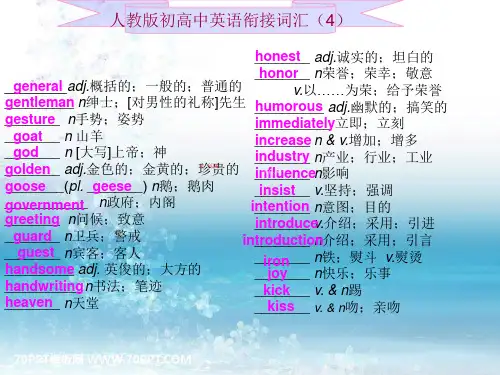
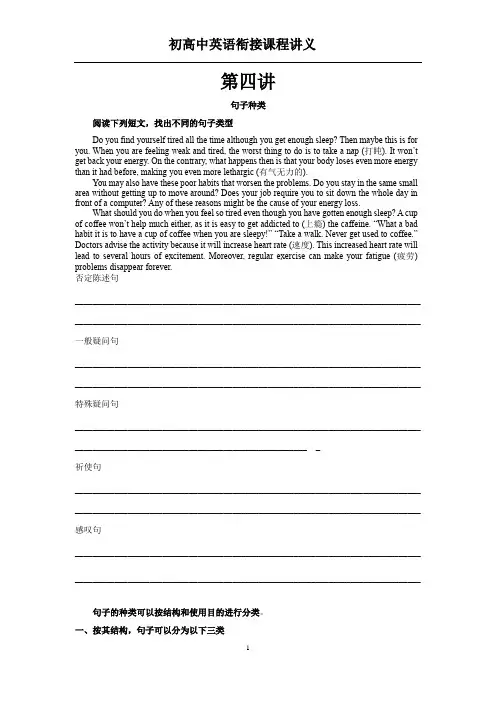
第四讲句子种类阅读下列短文,找出不同的句子类型Do you find yourself tired all the time although you get enough sleep? Then maybe this is for you. When you are feeling weak and tired, the worst thing to do is to take a nap (打盹). It won’t get back your energy. On the contrary, what happens then is that your body loses even more energy than it had before, making you even more lethargic (有气无力的).You may also have these poor habits that worsen the problems. Do you stay in the same small area without getting up to move around? Does your job require you to sit down the whole day in front of a computer? Any of these reasons might be the cause of your energy loss.What should you do when you feel so tired even though you have gotten enough sleep? A cup of coffee won’t help much either, as it is easy to get addicted to (上瘾) the caffeine. “What a bad habit it is to have a cup of coffee when you are sleepy!” “Take a walk. Never get used to coffee.” Doctors advise the activity because it will increase heart rate (速度). This increased heart rate will lead to several hours of excitement. Moreover, regular exercise can make your fatigue (疲劳) problems disappear forever.否定陈述句_______________________________________________________________________________ _______________________________________________________________________________ 一般疑问句_______________________________________________________________________________ _______________________________________________________________________________ 特殊疑问句_______________________________________________________________________________ _____________________________________________________ _祈使句_______________________________________________________________________________ _______________________________________________________________________________ 感叹句_______________________________________________________________________________ _______________________________________________________________________________句子的种类可以按结构和使用目的进行分类。
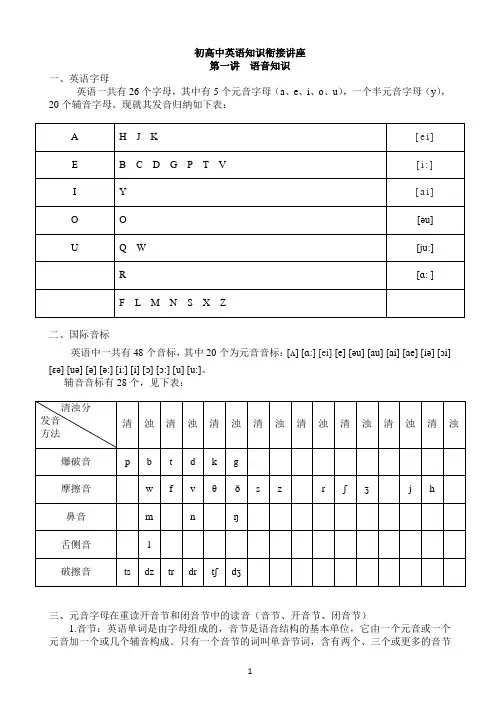
初高中英语知识衔接讲座第一讲语音知识一、英语字母英语一共有26个字母,其中有5个元音字母(a、e、i、o、u),一个半元音字母(y),20个辅音字母。
现就其发音归纳如下表:二、国际音标英语中一共有48个音标,其中20个为元音音标:[ʌ] [ɑ:] [ei] [e][əu] [au] [ai] [ae] [iə] [ɔi][ɛə] [uə] [ə] [ə:] [i:] [i] [ɔ] [ɔ:] [u] [u:]。
辅音音标有28个,见下表:三、元音字母在重读开音节和闭音节中的读音(音节、开音节、闭音节)1.音节:英语单词是由字母组成的,音节是语音结构的基本单位,它由一个元音或一个元音加一个或几个辅音构成。
只有一个音节的词叫单音节词,含有两个、三个或更多的音节的单词,分别称为双音节词和多音节词。
2.开音节:以一个元音字母结尾的重读音节称为开音节(或称绝对开音节)。
例如:be,no,hi,we,go,so等。
包含一个元音字母的重读音节中,在元音字母后面有一个辅音字母(r除外),还有一个不发音的字母e,这种重读音节也叫开音节(或称相对开音节)。
例如:name,time,bike,cake,nose等。
不论是绝对开音节还是相对开音节,其元音字母读它们本身的发音,即a [ei] e[i:] i[ai] o[əu] u[ju:]。
3.闭音节:包含一个元音字母,而以辅音字母(r,w除外)结尾的重读音节,称为闭音节。
例如:cap,desk,big,bus,hat等。
元音字母在重读闭音节中读它的短音,即a[ae] e[e] i[i] o[ɔ] u[ʌ]。
4.重读音节和非重读音节:只有一个音节的词都是重读音节,不标出重读符号。
在双音节或多音节词中,其中有一个需要读得较响亮的音节,这个音节就叫重读音节。
重读音节用―'‖符号表示。
例如:family['f aemili],table['teibl]。
重读音节之外的音节称为非重读音节。
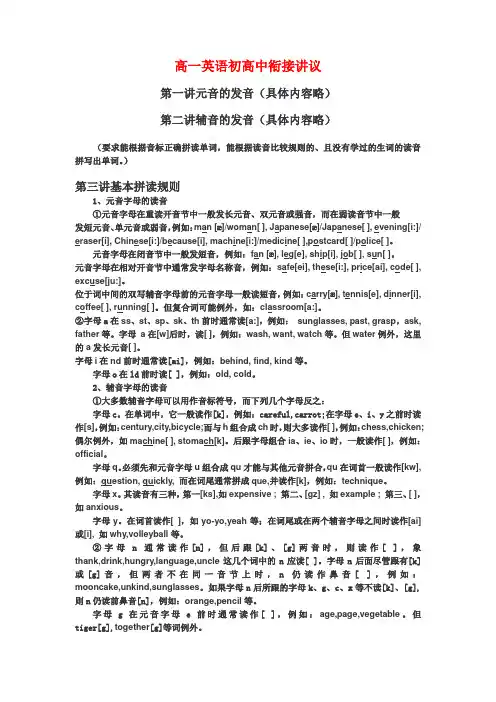
高一英语初高中衔接讲议第一讲元音的发音(具体内容略)第二讲辅音的发音(具体内容略)(要求能根据音标正确拼读单词,能根据读音比较规则的、且没有学过的生词的读音拼写出单词。
)第三讲基本拼读规则1、元音字母的读音①元音字母在重读开音节中一般发长元音、双元音或强音,而在弱读音节中一般发短元音、单元音或弱音,例如:man [æ]/woman[ ], Japanese[æ]/Japanese[ ], evening[i:]/ eraser[i], Chinese[i:]/because[i], machine[i:]/medicine[ ],postcard[ ]/police[ ]。
元音字母在闭音节中一般发短音,例如:fan [æ], leg[e], ship[i], job[ ], sun[ ]。
元音字母在相对开音节中通常发字母名称音,例如:safe[ei], these[i:], price[ai], code[ ], excuse[ju:]。
位于词中间的双写辅音字母前的元音字母一般读短音,例如:carry[æ], tennis[e], dinner[i], coffee[ ], running[ ]。
但复合词可能例外,如:classroom[a:]。
②字母a在ss、st、sp、sk、th前时通常读[a:],例如:sunglasses, past, grasp,ask, father等。
字母a在[w]后时,读[ ],例如:wash, want, watch等。
但water例外,这里的a发长元音[ ]。
字母i在nd前时通常读[ai],例如:behind, find, kind等。
字母o在ld前时读[ ],例如:old, cold。
2、辅音字母的读音①大多数辅音字母可以用作音标符号,而下列几个字母反之:字母c。
在单词中,它一般读作[k],例如:careful,carrot;在字母e、i、y之前时读作[s],例如:century,city,bicycle;而与h组合成ch时,则大多读作[ ],例如:chess,chicken;偶尔例外,如machine[ ], stomach[k]。
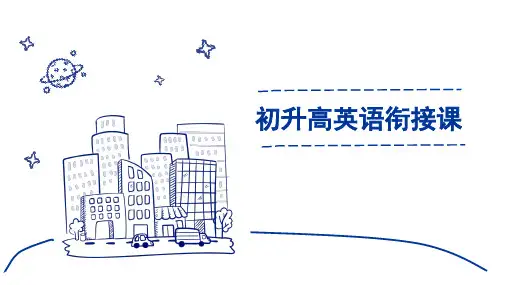

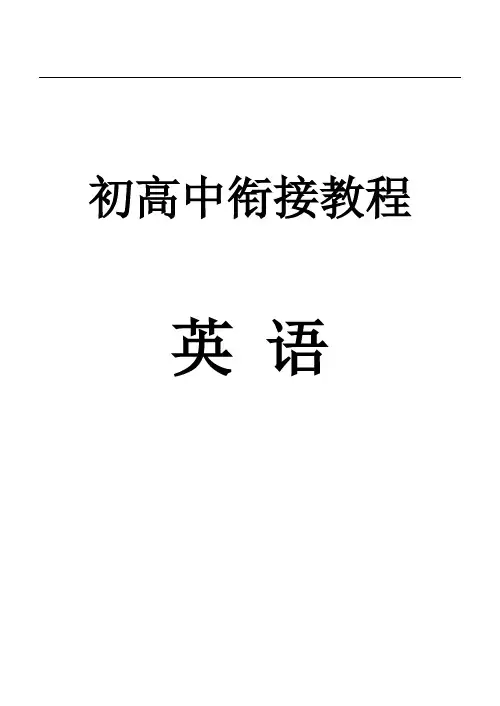

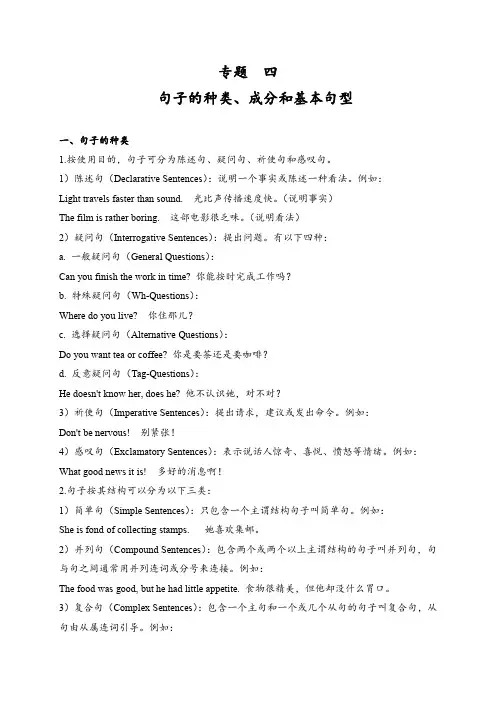
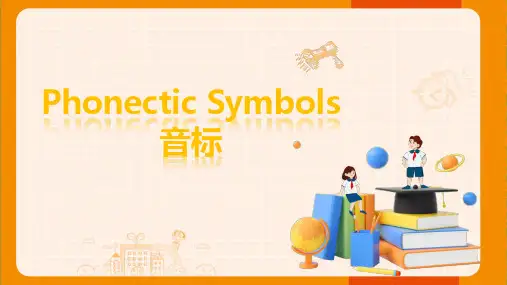
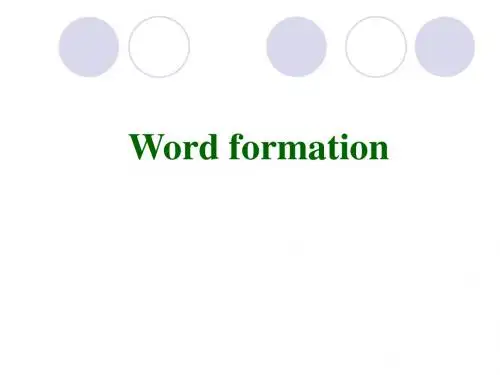
高一英语导学案 一.学习目标:1. 能说出初中词汇表字母D 所有单词的意思 2. 会运用每一个重点词汇 二.重点难点:1. 黑体词汇 2. 动词时态语态――一般过去时 3. 限时完成完型填空或阅读理解 三. 学习过程: 导入学习 I. 从上面方框中选择10个单词,用其正确形式补全以下句子。
1. How many factory workers are in ______________ of losing their jobs?. 2. We discussed different ways of ______________ with the problem. 3. At last, Susan ______________ that she was ready to try the trip on her own. 4. The temperature will _______________ to around 15 degrees. 5. ---Can you lend me some money? ---Sure, will $20_____________? 6. It is not uncommon for students to have ____________ in learning English grammar. 7. The seaside here ___________ a lot of tourists every summer. 8. Remember that everything can be settled by______________. 9. The world is _____________ into seven continents. 10. Old English is very _____________ from the English we speak now. II. 单项选择 1. Sorry to ________ you, but can I talk to you for a minute? A. doubt B. disturb C. direct D. dismiss 2. We ________ on energy to do many things in our daily lives. A. depend B. dare C. dig D. discuss 3. She asks________ and then tells her friends. A.dialogues B. doubts C. directions D. discoveries 4. She went to the bookstore and bought __________. A. dozen books B. dozens books C. dozen of books D. dozens of books 班 级: 姓 名:装订线5. In the painting, a young woman sits alone and is ________ in thought.A. deliciousB. deafC. dirtyD. deep合作学习III. 完形填空One Sunday morning, Millie and Amy went to Sunshine Park. They love to chat there. As usual, they sat 1 a big tree. Suddenly, they heard a whistle from the bushes behind the tree. They turned around but could not see anything unusual. They were 2 .“Is 3 there?” Millie asked. Nobody answered. They 4 very carefully and heard the strange noise again. The two girls were very afraid. They ran away quickly. On their way, they met Andy.“What happened?” Andy asked. “There’s a ghost in the 5 . Please help us.” Millie said. “Really? Tell me more.” Andy said. Millie told Andy everything. Andy went to the park, 6 beside the tree and listened carefully. Then he heard 7 noise! He looked behind the tree and heard another whisper. He was now sure the sound 8 from the bushes. He searched carefully.“Oh! Here it is.” Andy said to himself. He9 a little cat in the bushes. It was very weak. When it miaowed, 10 made a sound like a whisper.1. A. under B. on C. behind D. in2. A. excited B. frightened C. frightening D. exciting3. nobody B. everybody C. anybody D. somebody4. A. saw B. looked C. heard D. listened5. A. church B. school C. garden D. park6. A. rose B. slept C. stood D. lay7. A. a B. the C. an D. other8. A. came B. learned C. heard D. fell9. A. smelled B. looked C. searched D. found10. A. he B. she C. it D. that应用学习IV. 汉译英:(一般过去时)1.我的小女儿是十二月出生的。
精选教课课件设计| Excellent teaching plan初高中英语连接班讲义江苏省黄桥中学的2021 年新高一的同学们,进入高一此后有时会感觉所学知识复杂、繁琐、易忘。
面对这种疑惑,我希望同学们第一要理解:学英语是一个漫长的过程,逛逛停停便难有成就。
要有连续性、连续性。
比方烧开水,在烧到80 度时停下来,等水冷了又烧,没烧开又停,这样循环往复,又费精力又费电,很难喝到水。
学英语要一鼓作气。
每日坚持,在完好忘掉以前实时复习、加深印象,这样频频,直至形成永久性记忆。
假如等到忘掉了再来复习,就像又学新知识同样,那么,我们就永久是初学者,固然在辛辛苦苦地烧开水,却难品尝到其甘润。
所以希望同学们在平常的学习中除了要有大批的词汇量,还要有一种归纳、比较、错题整理、认真斟酌、理解的过程,所以我深信:投资我们的时间和心智+强盛的自我约= 成功!在这里我只说说高中生对英语的学习习惯,根本知识,解题技巧。
束力 +我们实质行动和信心如何玩转高中英语学习?——养成优秀的学习习惯!a.提早做好预习〔疏导单词和短语,熟读课文,做好各种标志〕,课后实时复习〔背诵词汇,背诵课文,高效达成练习,进行有效的错题整理〕〔切忌:考前抱佛脚或许因考而学〕b.增强学习的自主性并逐渐完美合适自己的学习方法,合理分派学习时间,有方案有步骤。
(切忌:过分依靠老师或许被动式学习〕〔听闻读写每日都要获取落实〕〔建议买一本高考词汇书,记忆大批的词汇〕c.多反省,多总结,既要有充足地练习更要跳出练习进行归纳和思虑。
高中英语学习的方法一般说来,初中属于知识型学习;而高中属于应用型学习。
所以,在初中,同学们只需熟记了课本中的单词、掌握了语法的条条框框,考试中就能得高分,甚至总分值。
但是,高中英语就不同样,哪怕你熟记了所有的单词、短语和语法例那么,可是考试中不必定能得高分。
所以,同学们在高中一定改进英语学习方法,那么终究该如何学习呢?在此提出一些建议供大家参照:一、背诵是学好英语的根基要学好一门语言,背诵是一定的。
【同步教育信息】一. 本周教学内容初升高英语衔接班第4讲非谓语动词之动词不定式二. 重、难点(一)非谓语动词概述动词在句中除充当谓语外,还可以起名词、形容词或副词的作用。
在句中充当主语、宾语、表语、补语、定语和状语。
这就是动词的非谓语形式。
当句中需要用某种动作作主语、宾语或作某种修饰、说明的成分时,就要用这种形式。
动词非谓语形式有三种:动词不定式to do,分词(现在分词和过去分词)和动名词,动词非谓语形式不随主语的人称和数的变化而变化,故又称为非限定性动词。
动词非谓语形式仍具有动词的一般特征,可以带有宾语、状语等构成短语。
(二)动词不定式动词不定式能起名词、形容词和副词作用,充当谓语以外的各种成分。
1. 作主语:不定式可以直接放在句首做一句话的主语,如:To learn English is not an easy thing . 学习英语不是一件容易的事。
也可以用it作形式主语,而将不定式充当的真正主语放在后面。
如:It is important to protect our environment . 保护环境是重要的。
2. 作宾语:很多动词后面都可带不定式作宾语,如want , decide , agree , would like , hope , wish等。
如:He wants to visit Nanjing . 他要参观南京。
Mary decided to go alone . 玛丽决定一个人去。
3. 作宾语补足语:这样的动词有want , would like , wish , ask , tell , expect等,但我们需要注意有的动词后带不带“to”的不定式作宾语补足语。
如“使役动词”:let , have , make+宾语+do,感官动词hear / see / feel / notice …+宾语+do,另外,感官动词还可以加doing作宾语补足语,这时我们要知道与加不带to的不定式之间的区别。
如:I expect you to write to me . 我盼望你给我来信。
I asked him to show me his new dictionary . 我要他给我看看他的新词典。
The landlord made my grandfather work in the field all day .地主以前让我祖父整天在田里干活。
I often hear her sing when I am free . 当我有空时常听她唱歌。
4. 作表语:如:My hope is to become an artist . 我的愿望是成为一名艺术家。
The young man seems to be a college graduate . 那个年轻人好像是个大学毕业生。
To see is to believe . 百闻不如一见。
(眼见为实)She was seen to enter the hall . 有人看见她到大厅里去了。
注意此句用的是see的被动语态,它的主动语态是see sb. do sth.的短语,这种在主动语态中不带to的不定式作宾补的动词,在被动中要还原to。
5. 作定语:动词不定式作定语时,不定式所表示的动作与其所修饰的中心词之间一般有三种关系:(1)动宾关系:即动词不定式所表示的动作与其所修饰的中心词之间具有逻辑上的动宾关系。
如:She has a lot of homework to do . 她有很多作业要做。
句中不定式to do与homework之间构成动宾关系。
注意:当作定语的不定式中的动词为不及物动词时,不定式后面要加适当的介词。
如:He needed a chair to sit on . 他需要一把椅子坐。
I want a pen to write with . 我要一支笔写字。
(2)主谓关系:中心词与不定式所表示的动作之间具有逻辑上的主谓关系,即中心词是不定式动作的发出者。
如:She is always the first to come to school. 她总是第一个到学校来。
句中的the first是to come to school这一动作逻辑上的主语,即这个动作的发出者。
(3)同位关系:作定语的不定式是对中心词内容的解释和说明。
如:This is the best way to solve the problem . 这是解决问题的最好办法。
句中的way的内容是to solve the problem,二者之间是同位的关系。
6. 作状语:不定式在句中一般可作三种状语:目的状语、结果状语和原因状语。
(1)作目的状语:这时不定式前面还可加上in order和so as,构成in order to do和so as to do的形式,意为“为了……;以便于……”,作目的状语的动词不定式可放在句首,也可放在句尾。
如:In order to get there on time , he started very early . 为了能按时到那儿,他很早便动身了。
She came here to visit some friends . 她来到这儿是为了拜访一些朋友。
此外,我们还需注意,不定式作目的状语构成的简单句可以与in order that …和so that…引导的目的状语从句之间进行互换。
如:He started very early so that / in order that he could get there on time .(2)作结果状语:不定式作结果状语常用于too…to和enough to…的结构中,此外,还有only to…也表示结果。
如:He is too young to go to school . 他年龄太小,不能上学。
Xiao Ming is old enough to join the army . 小明到了参军的年龄。
I went to the cinema in a hurry only to find that the film had already finished .我匆匆忙忙地赶到电影院,结果却发现电影已经结束了。
(3)作原因状语:作原因状语的不定式常出现在表示情感的形容词后面,表示产生这种情感的原因。
如:My father was surprised to hear the news .我父亲听到这个消息,感到惊奇。
I’m sorry to hear that . 听到这件事,我感到很遗憾/抱歉。
I’m happy to see you . 见到你我很高兴。
7. 不定式的否定形式:在to前加not即可。
如:He decided not to take up the job . 他决定不干这个工作。
The teacher told him not to be late again . 老师告诉他别再迟到了。
8. “疑问词+不定式”结构:(1)常用于此结构的动词有:tell , teach , know , learn , wonder , show , ask等,这些词后面可以接宾语从句,当主句与从句的主语一致时,后面的宾语从句可简化成“疑问词+不定式”的结构。
如:I want to know how I can get there . = I want to know how to get there .我想知道怎样去那儿。
(2)当动词tell , ask , show , teach等后带双宾语且直接宾语是从句时,当宾语从句主语和间接宾语一致时,宾语从句可以转换成“疑问词+不定式”的结构。
如:Please tell me where I can find her . = Please tell me where to find her .请告诉我到哪儿能找到她。
9. 作简短回答时或避免不必要的重复时,动词不定式可省略to后的动词,但不定式的标志“to”不可以省略。
如:—Did you go to see the Great Wall ?—No , I wanted to(go to see it), but there wasn’t time .你游览长城了吗?没有,我想去(游览长城),但是没时间。
Will you help me ? —I’ll try to(help you).你愿意帮助我吗?我会尽力而为。
(但不一定能做到)10. 如果动词不定式的逻辑主语不是句子的主语或谓语动词的宾语,需要在这一逻辑主语前加for。
如:I opened the door for her to come in . 我开了门让她进来。
(不定式的逻辑主语是her)试比较:I want to open the door . 我要开门。
(动词不定式to open的逻辑主语是I)I want him to open the door . 我要他把门打开。
(to open的逻辑主语是谓语want的宾语him)【模拟试题】综合练习(一)1. After school we usually play basketball for half an hour on playground .A. the ; theB. / ; /C. / ; theD. the ; /2. There are few in the fridge . Let’s go and buy some peas , carrots and cabbages .A. vegetablesB. fruitC. meatD. eggs3. About of the workers in the clothes factory are women .A. third fifthsB. third fifthC. three fifthsD. three fifth4. The two little girls are crying . cannot find mother .A. She , herB. They , themC. They , theirD. They , her5. Jim always comes to school of all because he has to open the door for others .A. earlyB. earlierC. most earlyD. earliest6. — were you away from school last year ?—About two weeks .A. How oftenB. How soonC. How longD. When7. We have four classes the morning and then have a rest noon .A. in ; inB. in ; atC. on ; atD. at ; in8. —What are you going to do in the future ?—I’d like to be a doctor you are .A. soB. asC. whatD. when9. —Can you go swimming with us this afternoon ?—Sorry , I can’t . I take care of my little sister at home because my mother is ill .A. canB. mayC. wouldD. have to10. —I wonder where I could find something about the Museum of Natural History . —Why on the Internet ? There’s a lot of information there .A. don’t goB. not to goC. not goingD. not go11. He finished the book yesterday evening .A. seeingB. watchingC. readingD. looking12. Where Jane and Kate ? Oh , they to the reading-room .A. is ; wentB. were ; are goingC. are ; have beenD. are ; have gone13. He something important when suddenly something a very loud noise outside .A. was thought ; madeB. thought ; was makingC. was thinking ; madeD. was thinking ; was making14. A talk on Chinese history in the school hall next week .A. is givenB. has been givenC. will be givenD. will given15. Don’t your coat , Tom ! It’s easy to catch cold in spring .A. take awayB. take offC. take downD. take out16. There is a beautiful clock on the wall , ?A. isn’t thereB. is thereC. isn’t itD. doesn’t it17. There a lot of important news in today’s newspapers .A. areB. isC. wereD. is going to have18. Could you tell me ?A. where can I buy this kind of CD playerB. where could I buy this kind of CD playerC. I can buy this kind of CD player whereD. where I can buy this kind of CD player19. Could you tell me ?A. when will Tom come backB. when does Tom come backC. when Tom will come backD. when Tom comes back20. —Would you like this skirt , Madam ?—Mmm ! Very nice ! I’ll take .A. thisB. itC. themD. those21. I don’t think the number of people this happens is very large .A. whoB. to whichC. thatD. to whom22. Shanghai lies the east of China .A. toB. inC. onD. at23. —Oh , it’s late at nigh . We must go to bed now .— .A. Good morningB. GoodbyeC. Good nightD. Good evening24. —If you don’t like the red coat , take the blue one .—OK , but do you have size in blue ? This one’s a bit tight for me .A. a bigB. a biggerC. the bigD. the bigger综合练习(二)1. She has orange skirt , skirt is nice .A. a ; theB. an ; theC. an ; aD. the ; the2. Mr. Green has lived in the hotel since he came to China .A. five-starB. five-starsC. five star’sD. five stars3. About people are in the People’s Park at weekends .A. two hundredsB. two hundreds ofC. two hundredD. hundred of4. —There isn’t water here . Could you get for me ?—All right .A. some ; someB. any ; anyC. some ; anyD. any ; some5. Now the air in our hometown is than it was before . Something must be done .A. much betterB. more worseC. more betterD. much worse6. Lucy and I are classmates . We in Class One .A. all areB. are allC. both areD. are both7. —Your coat looks very nice . What is it made ?—Cotton . And it is made Shanghai .A. in ; byB. from ; byC. by ; inD. of ; in8. —What do you like doing after class ?—I like not only reading painting .A. andB. but alsoC. orD. for9. “ What I do for you ? ” means “ I help you ? ”A. can , MayB. shall , NeedC. can , ShallD. will , Shall10. Sorry , I can’t hear you clearly . Will you please your e-mail address ? I’ll write it down .A. reviewB. reciteC. reportD. repeat11. —It’s too hot . Would you mind the door ?— . Please do it now .A. to open ; OKB. opening ; Certainly notC. opening ; Of courseD. to open ; Good idea12. — you your clothes ?—Yes .—When you it ?A. Have ; washed ; did ; washB. Did ; washed ; did ; washC. Have ; washed ; have ; washedD. Do ; wash ; did ; wash13. I a magazine(杂志)when the teacher up to me .A. was reading ; cameB. read ; was comingC. was reading ; was comingD. read ; came14. Mr. Chen has a loud voice . His voice can clearly even in that big classroom .A. hearB. be heardC. be hearingD. have heard15. After years of hard work , his dream in the end .A. came outB. came trueC. came overD. came up16. The computer is very useful in our life , it ?A. isn’tB. wasn’tC. hasn’tD. doesn’t17. Both Kate and I ready for the picnic now .A. is notB. is gettingC. are gettingD. am getting18. She said she me five letters in one month .A. has writtenB. will writeC. had writtenD. wrote19. The poor man ate a big breakfast he said he wasn’t hungry .A. sinceB. becauseC. thoughD. for20. How far is from Beijing Shanghai ?A. it ; toB. this ; tillC. that ; tillD. / ; to21. We are talking about Tonny , you met yesterday .A. whomB. whichC. thatD. with who22. — ?—I have a headache , doctor .A. What’s the troubleB. What wrong with youC. What’s your nameD. What matter23. The children planted more trees and flowers after they Greener China .A. joinedB. took part inC. becameD. were24. They planted trees . Each time trees were planted .A. twice a year ; thousands ofB. two times a year ; two thousandC. twice every year ; two thousands ofD. two times each year ; two thousand综合练习(三)1. Look , you missed “ l ” in word “ could ” .A. a ; theB. a ; aC. an ; theD. an ; a2. She has been in Tianjin for ten years . Tianjin has become her second .A. familyB. houseC. homeD. room3. —Which is the smallest number of the four ?— .A. Two-thirdsB. A halfC. A quarterD. Three-fourths4. of them has a dictionary and one of them can look up words in the dictionary .A. Each ; everyB. Every ; eachC. Each ; eachD. Every ; every5. —Is the physics problem ?—Yes . I can work it out .A. easy ; easilyB. easy ; easyC. easily ; easyD. easily ; easily6. We have never seen film before . It’s ve ry interesting .A. so a goodB. a so goodC. such a goodD. a such good7. —What did Mary have breakfast this morning ?—She was late for school and hurried off breakfast .A. for ; withoutB. at ; withoutC. for ; afterD. at ; after8. Get up early tomorrow , you can’t get there before seven .A. soB. butC. andD. or9. —Must I hand in the exercise-book now ?—No , you . You hand it in tomorrow .A. mustn’t ; needB. mustn’t ; mayC. can’t ; mayD. needn’t ; may10. Excuse me . Would you please tell me buy a digital camera ?A. what toB. where toC. what I canD. where can I11. He Mr. Hu to give him some work during the holiday .A. want ; to doB. wants ; to doC. ask ; to doD. hopes ; do12. They good friends since they know each other .A. were ; wereB. were ; hadC. had been ; didD. have been ; got to13. listen to the radio while you your homework .A. Don’t ; are doingB. Not ; doC. Aren’t ; are doingD. Not to ; do14. The APEC meeting in Shanghai last autumn . I hear it in different countries every year .A. is held ; is heldB. was held ; is heldC. was held ; has heldD. is held ; was held15. Could you tell me something more about Hong Kong ? I’m going there for a holiday soon .A. looking upB. thinking aboutC. trying outD. finding out16. Neither of them is right , ?A. is heB. isn’t heC. aren’t theyD. is it17. The mother with little son at my home that snowy night .A. were ; atB. was ; atC. were ; onD. was ; on18. The woman still doesn’t know what in her hometown while she was away .A. happensB. happenedC. will happenD. was happened19. The students will go to the Summer Palace if it tomorrow .A. don’t rainB. won’t rainC. doesn’t rainD. isn’t rain20. is difficult to work on the Great Green Wall .A. ThisB. ItC. ThatD. Its21. It Mike and Lily helped the old woman yesterday .A. were ; whoB. were ; whomC. was ; whoD. was ; whose22. Would you please show me the printing machine ?A. how can I useB. what can I useC. how to useD. what to use23. —Hello . May I speak to Mike ?— . Please call back later .A. Wait a minuteB. Hold on for a momentC. SpeakingD. Sorry , he is out24. The little boy when he said he had in bed all the morning .A. lied ; layB. lay ; liedC. lied ; lainD. lay ; had lied【试题答案】综合练习(一)1—5 CACCD 6—10 CBBDD 11—15 CDCCB 16—20 ABDCB21—24 DBCB综合练习(二)1—5 BACDD 6—10 DDBAD 11—15 BAABB 16—20 ACCCA21—24 AAAA综合练习(三)1—5 CCCAA 6—10 CADDB 11—15 BDABB 16—20 ADBCB21—24 CCDC【试题分析】综合练习(一)6. 答案:C。